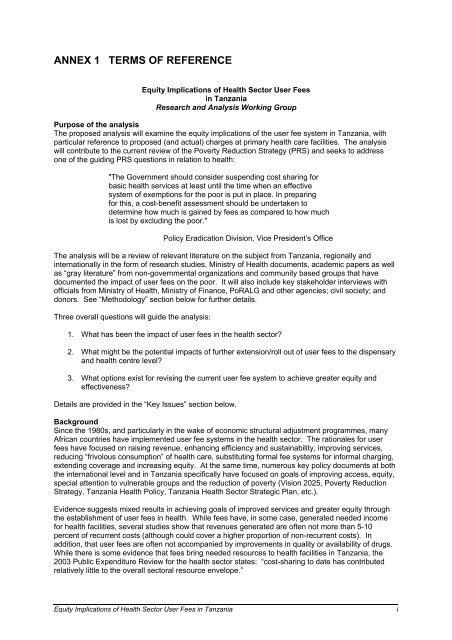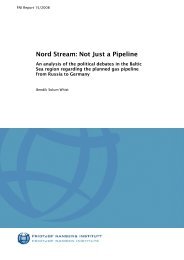equity implications of health sector user fees in tanzania
equity implications of health sector user fees in tanzania
equity implications of health sector user fees in tanzania
Create successful ePaper yourself
Turn your PDF publications into a flip-book with our unique Google optimized e-Paper software.
ANNEX 1 TERMS OF REFERENCE<br />
Equity Implications <strong>of</strong> Health Sector User Fees<br />
<strong>in</strong> Tanzania<br />
Research and Analysis Work<strong>in</strong>g Group<br />
Purpose <strong>of</strong> the analysis<br />
The proposed analysis will exam<strong>in</strong>e the <strong>equity</strong> <strong>implications</strong> <strong>of</strong> the <strong>user</strong> fee system <strong>in</strong> Tanzania, with<br />
particular reference to proposed (and actual) charges at primary <strong>health</strong> care facilities. The analysis<br />
will contribute to the current review <strong>of</strong> the Poverty Reduction Strategy (PRS) and seeks to address<br />
one <strong>of</strong> the guid<strong>in</strong>g PRS questions <strong>in</strong> relation to <strong>health</strong>:<br />
"The Government should consider suspend<strong>in</strong>g cost shar<strong>in</strong>g for<br />
basic <strong>health</strong> services at least until the time when an effective<br />
system <strong>of</strong> exemptions for the poor is put <strong>in</strong> place. In prepar<strong>in</strong>g<br />
for this, a cost-benefit assessment should be undertaken to<br />
determ<strong>in</strong>e how much is ga<strong>in</strong>ed by <strong>fees</strong> as compared to how much<br />
is lost by exclud<strong>in</strong>g the poor."<br />
Policy Eradication Division, Vice President’s Office<br />
The analysis will be a review <strong>of</strong> relevant literature on the subject from Tanzania, regionally and<br />
<strong>in</strong>ternationally <strong>in</strong> the form <strong>of</strong> research studies, M<strong>in</strong>istry <strong>of</strong> Health documents, academic papers as well<br />
as “gray literature” from non-governmental organizations and community based groups that have<br />
documented the impact <strong>of</strong> <strong>user</strong> <strong>fees</strong> on the poor. It will also <strong>in</strong>clude key stakeholder <strong>in</strong>terviews with<br />
<strong>of</strong>ficials from M<strong>in</strong>istry <strong>of</strong> Health, M<strong>in</strong>istry <strong>of</strong> F<strong>in</strong>ance, PoRALG and other agencies; civil society; and<br />
donors. See “Methodology” section below for further details.<br />
Three overall questions will guide the analysis:<br />
1. What has been the impact <strong>of</strong> <strong>user</strong> <strong>fees</strong> <strong>in</strong> the <strong>health</strong> <strong>sector</strong>?<br />
2. What might be the potential impacts <strong>of</strong> further extension/roll out <strong>of</strong> <strong>user</strong> <strong>fees</strong> to the dispensary<br />
and <strong>health</strong> centre level?<br />
3. What options exist for revis<strong>in</strong>g the current <strong>user</strong> fee system to achieve greater <strong>equity</strong> and<br />
effectiveness?<br />
Details are provided <strong>in</strong> the “Key Issues” section below.<br />
Background<br />
S<strong>in</strong>ce the 1980s, and particularly <strong>in</strong> the wake <strong>of</strong> economic structural adjustment programmes, many<br />
African countries have implemented <strong>user</strong> fee systems <strong>in</strong> the <strong>health</strong> <strong>sector</strong>. The rationales for <strong>user</strong><br />
<strong>fees</strong> have focused on rais<strong>in</strong>g revenue, enhanc<strong>in</strong>g efficiency and susta<strong>in</strong>ability, improv<strong>in</strong>g services,<br />
reduc<strong>in</strong>g “frivolous consumption” <strong>of</strong> <strong>health</strong> care, substitut<strong>in</strong>g formal fee systems for <strong>in</strong>formal charg<strong>in</strong>g,<br />
extend<strong>in</strong>g coverage and <strong>in</strong>creas<strong>in</strong>g <strong>equity</strong>. At the same time, numerous key policy documents at both<br />
the <strong>in</strong>ternational level and <strong>in</strong> Tanzania specifically have focused on goals <strong>of</strong> improv<strong>in</strong>g access, <strong>equity</strong>,<br />
special attention to vulnerable groups and the reduction <strong>of</strong> poverty (Vision 2025, Poverty Reduction<br />
Strategy, Tanzania Health Policy, Tanzania Health Sector Strategic Plan, etc.).<br />
Evidence suggests mixed results <strong>in</strong> achiev<strong>in</strong>g goals <strong>of</strong> improved services and greater <strong>equity</strong> through<br />
the establishment <strong>of</strong> <strong>user</strong> <strong>fees</strong> <strong>in</strong> <strong>health</strong>. While <strong>fees</strong> have, <strong>in</strong> some case, generated needed <strong>in</strong>come<br />
for <strong>health</strong> facilities, several studies show that revenues generated are <strong>of</strong>ten not more than 5-10<br />
percent <strong>of</strong> recurrent costs (although could cover a higher proportion <strong>of</strong> non-recurrent costs). In<br />
addition, that <strong>user</strong> <strong>fees</strong> are <strong>of</strong>ten not accompanied by improvements <strong>in</strong> quality or availability <strong>of</strong> drugs.<br />
While there is some evidence that <strong>fees</strong> br<strong>in</strong>g needed resources to <strong>health</strong> facilities <strong>in</strong> Tanzania, the<br />
2003 Public Expenditure Review for the <strong>health</strong> <strong>sector</strong> states: “cost-shar<strong>in</strong>g to date has contributed<br />
relatively little to the overall <strong>sector</strong>al resource envelope.”<br />
Equity Implications <strong>of</strong> Health Sector User Fees <strong>in</strong> Tanzania I













